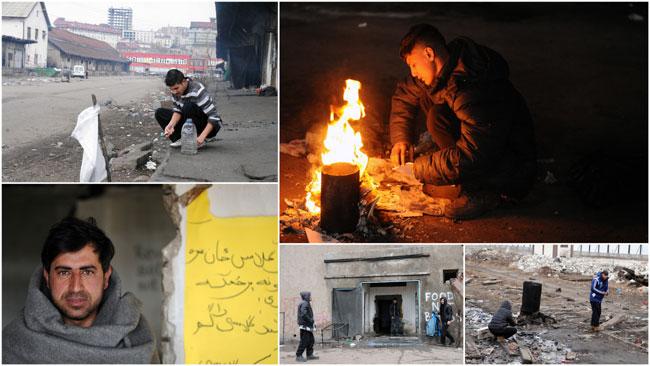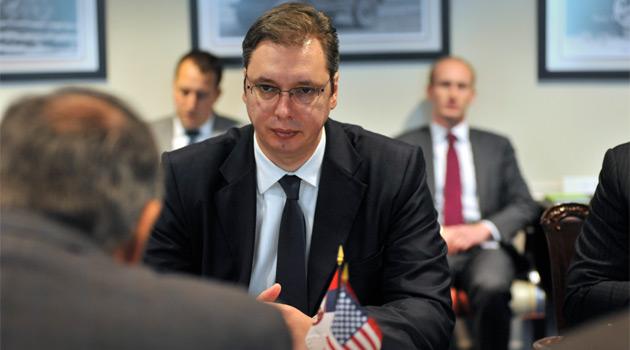PHOTO GALLERY: Refugees living in abandoned warehouses in Belgrade, Serbia

In several abandoned warehouses near the main train station in Belgrade, Serbia, roughly 1 200 refugees, predominantly from Afghanistan and Pakistan, are surviving in shocking hygienic conditions and low temperatures. Nighttime temperatures there at the end of January were around 15 degrees below zero Celsius.
February temperatures remained below freezing at night there. Some of the migrants are wearing just shoes without socks.
Insufficiently dressed, they are sleeping under grey blankets and burning practically any flammable materials, including plastic and polystyrene, in improvised brick stoves to keep warm. As a consequence, the smoke-filled halls are full of very acrid, bad air that is almost unbreathable.
The catastrophic hygiene conditions are further exacerbated by the amount of garbage in the ditches between the halls and the stench of human feces wafting up from the dusty ground. The refugees recently were bathing outdoors, despite the freezing weather, warming themselves by burning railroad ties impregnated with tar that produces toxic fumes when on fire.
PHOTO GALLERY

In addition to frostbite, many of the residents also are experiencing breathing difficulties as a result of smoke inhalation. Most have lived in the abandoned warehouses for more than four months.
Despite the unfavorable conditions in which the refugees are living, they are friendly, and some do not do not hesitate to invite new arrivals for tea. “Sometimes at night I can’t feel my feet, but I do my best to sleep despite that,” said Hazrat Bilal, a 14-year-old unaccompnied minor, orginally from Afghanistan, who has been living in the hall the last four months.
“I know the smoke is bad for me, but what else can I do in this cold?” Bilal adds as he crouches over the burning railroad ties. Like many others, he intends to cross Serbia’s border with either Croatia or Hugnary.
Most refugees in the warehouses say they have attempted to cross countless times, only to be beaten and pushed back into Serbia. “The smugglers took all my money, the others beat me,” says Bilal, who syas he fled the violence happening near his home in Afghanistan after his father was murdered.
“I must attempt to cross the border again, one of these times it will work,” he says with determination. Roughly 390 such people have recently been transported by the Government into a newly-established accommodation facility in the town of Obrenovac.
The Serbian authorities, together with the UNHCR, are currently working on expanding the capacity of that residential hotel to accept those who rejected previous relocation offers but now want to leave the warehouses. Thanks to the efforts of the authorities, the humanitarian agencies in Serbia, and the UNHCR, 82 % of the total number of 7 300 asylum-seekers, immigrants and refugees living in the country have been relocated into heated, government-run dwellings over the past several months.
Nevertheless, an estimated 1 200 males, including roughly 300 boys who are in Serbia without any other family members, are camped in the abandoned, smoke-filled warehouses near the main train station, according to a report by the UNHCR. “It’s not good here, and I’m absolutely on my own. It will be very good in the shelter. There are too many problems here, we’re all ill,” 13-year-old Jibral Kochel of Afghanistan told us.
“I had to leave, it was terribly cold and dirty there,” said Kiramat Safi, a 17-year-old boy, also from Afghanistan, who after four months also voluntarily decided to leave the warehouses and move into a shelter in Krnjac. “Now I feel much better, it’s warmer here. There’s no smoke and I can sleep indoors.”
Another refugee, originally from Iraq, said of the UNHCR center: “The room is small, but I cannot be angry with Serbia, because they didn’t beat us here. We got a bed and hot food here.”
Other refugees who do not want to apply for asylum in Serbia and who will attempt to cross into another country instead will remain in the abandoned warehouses despie the danger that the smoke and sub-zero temperatures pose. The dismal situation in the halls full of toxic smoke was improved only around 21 February, thanks to the aid of volunteers from the Soul Welders nonprofit orgnaization, who brought the refugees axes for chopping wood to burn for fuel and installed temporary stoves in the halls.
Most of the refugees from Afghanistan, where battles are currently being waged with the radical Islamist movement the Taliban, have headed to Italy as a consequence of last year’s tightening of the border controls in Hungary and the closure of the so-called Balkan route. “Afghanistan is not safe!”, “Please help us!”, “Open the border!” are the most frequent messages graffitied onto the buildings of the abandoned warehouse complex near Belgrade’s main train station.
